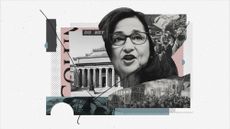The award for Fastest Pivot goes to ... the Oscars
The biggest and stodgiest awards show in Hollywood just responded rather nimbly to the Golden Globes' missteps


The Academy Awards released its nominees this morning, and for the first time in years, they didn't blow it.
Responding to spiraling news about Hollywood's epidemic of sexual discrimination would be a challenge for any feel-good event, much less one as old and white and male as the Oscars. But this year, the biggest awards show in film did so by rather nimbly correcting the missteps at the second biggest awards show, the Golden Globes.
Get Out's Jordan Peele and Ladybird's Greta Gerwig, both snubbed at the Globes earlier this month, each received well-deserved Oscar nominations for Best Director. Daniel Kaluuya finally got the Best Actor nomination he earned for his stand-out performance in Get Out. And James Franco, who won Best Actor for The Disaster Artist, the kind of movie L.A. loves because it's about movie-making, was snubbed — perhaps in response to the allegations against him that surfaced after his Globes win.
Subscribe to The Week
Escape your echo chamber. Get the facts behind the news, plus analysis from multiple perspectives.

Sign up for The Week's Free Newsletters
From our morning news briefing to a weekly Good News Newsletter, get the best of The Week delivered directly to your inbox.
From our morning news briefing to a weekly Good News Newsletter, get the best of The Week delivered directly to your inbox.
This all feels a mite corrective. Oscars voting closed Jan. 12, five days after the Globes. There was time to make right what that Globes got wrong, and plenty of pressure to do so. The #TimesUp campaign at the Golden Globes demonstrated that women are finally willing to make their displeasure at decades of exclusion felt. Their gestures ranged from large — the sea of black dresses, Oprah's speech, Barbra Streisand's open consternation at still being the only woman to have ever won Best Director — to small: Natalie Portman's "and here are the all-male nominees" as she introduced the Best Director award will go down as the smallest but sharpest etiquette rupture in Hollywood history. As the awards rolled on, it became clear that the men present were unequipped and unwilling to address the elephant in the room — they forcefully pretended this was business as usual — and that the women were throwing a wrench in the gears if things didn't change.
Change is hard, especially at the Oscars. Hollywood's stodgiest, most expensive, and most retrograde awards show has been struggling for years now to shake the boring vision of prestige that has long guided its choices. This has been tough, thanks in part to simple demographics. In 2012, Academy voters were 94 percent white and 77 percent male. After two consecutive years in which all 20 nominated actors were white despite exceptional performances from nonwhite actors, the #OscarsSoWhite campaign, which April Reign started back in 2015, really took off. Among other things, Reign's campaign turned a spotlight on the stunningly homogeneous makeup of the Academy. It made clear that the process by which prestige is defined might have more to do with demographics than sheer artistic merit.
In 2016, Academy president Cheryl Boone Isaacs declared a firm intention to reform the Academy from within by doubling its female and minority members by 2020 (and stripping inactive members of their voting privileges). "There aren't that many qualified people, period, of any race or gender, to invite each year," former president Hawk Koch observed. And indeed, despite her efforts, and the inclusion of a whopping 774 new members this year, the Academy is now ... 87 percent white and 72 percent male.
The machinery of change is creaky — a fact symbolically captured by last year's memorable snafu, in which the biggest award of the night was accidentally handed to La La Land instead of Moonlight. That makes it all the more surprising that the Oscars appear to have reacted swiftly to this year's Globes, the #TimesUp movement, and the allegations of sexual harassment and assault that have rocked Hollywood. From The Shape of Water to Phantom Thread to Get Out, Lady Bird, and Call Me By Your Name, the projects gathering the most nominations are experimental and off-kilter. And the Academy is explicitly rewarding speed: One of the more noteworthy nominees on this year's slate went to Christopher Plummer, who replaced alleged sexual harasser Kevin Spacey in a reshoot of All the Money in the World.
It's a truism at this point to state that the Academy Awards have never really been about merit. Still, it bears mentioning, for these things do have economic consequences. Because the Oscars have always really been arbiters of professional rather than artistic importance, its rewards dictate who, in subsequent years, will get more projects, more money, and more work. For a machine this old and change-resistant to react with the speed it has? That's due entirely to the pressure from activists who — via #OscarsSoWhite and #TimesUp — so effectively exposed the monocrop culture behind Hollywood's stodgiest meritocracy. And it's a pretty amazing to watch happen.
Awards shows compete with each other too, of course. As Seth Meyers pointed out in his Golden Globes monologue, every host was likely watching him to see how he would handle Hollywood pomp in the wake of the Harvey Weinstein revelations. It's hard to change your faux-merit contest in the midst of a sea-change, but the award for Fastest Pivot goes to ... the Oscars.
Create an account with the same email registered to your subscription to unlock access.
Sign up for Today's Best Articles in your inbox
A free daily email with the biggest news stories of the day – and the best features from TheWeek.com
Lili Loofbourow is the culture critic at TheWeek.com. She's also a special correspondent for the Los Angeles Review of Books and an editor for Beyond Criticism, a Bloomsbury Academic series dedicated to formally experimental criticism. Her writing has appeared in a variety of venues including The Guardian, Salon, The New York Times Magazine, The New Republic, and Slate.
-
 Is the Gaza war tearing U.S. campuses apart?
Is the Gaza war tearing U.S. campuses apart?Today's Big Question Protests at Columbia University, other institutions, pit free speech against student safety
By Joel Mathis, The Week US Published
-
 DOJ settles with Nassar victims for $138M
DOJ settles with Nassar victims for $138MSpeed Read The settlement includes 139 sexual abuse victims of the former USA Gymnastics doctor
By Justin Klawans, The Week US Published
-
 14 recent scientific breakthroughs
14 recent scientific breakthroughsIn Depth From photos of the infant universe to an energy advancement that could save the planet
By Devika Rao, The Week US Published
-
 Walter Isaacson's 'Elon Musk' can 'scarcely contain its subject'
Walter Isaacson's 'Elon Musk' can 'scarcely contain its subject'The latest biography on the elusive tech mogul is causing a stir among critics
By Theara Coleman Published
-
 Welcome to the new TheWeek.com!
Welcome to the new TheWeek.com!The Explainer Please allow us to reintroduce ourselves
By Jeva Lange Published
-
 The Oscars finale was a heartless disaster
The Oscars finale was a heartless disasterThe Explainer A calculated attempt at emotional manipulation goes very wrong
By Jeva Lange Last updated
-
 Most awkward awards show ever?
Most awkward awards show ever?The Explainer The best, worst, and most shocking moments from a chaotic Golden Globes
By Brendan Morrow Published
-
 The possible silver lining to the Warner Bros. deal
The possible silver lining to the Warner Bros. dealThe Explainer Could what's terrible for theaters be good for creators?
By Jeva Lange Last updated
-
 Jeffrey Wright is the new 'narrator voice'
Jeffrey Wright is the new 'narrator voice'The Explainer Move over, Sam Elliott and Morgan Freeman
By Jeva Lange Published
-
 This week's literary events are the biggest award shows of 2020
This week's literary events are the biggest award shows of 2020feature So long, Oscar. Hello, Booker.
By Jeva Lange Published
-
 What She Dies Tomorrow can teach us about our unshakable obsession with mortality
What She Dies Tomorrow can teach us about our unshakable obsession with mortalityThe Explainer This film isn't about the pandemic. But it can help viewers confront their fears about death.
By Jeva Lange Published